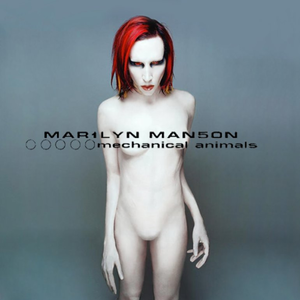"If
you act like a rock star, you will be treated like one," wrote Marilyn Manson
in his 1998 autobiography, The Long Hard
Road Out of Hell. Since the start of his career, it is a philosophy he has
accordingly upheld. In a time where rock music seems too safe, Manson (born
Brian Hugh Warner) is the last of his generation (second to Alice Cooper) to live
up to the excesses of rock star life and perhaps the last for future
generations to come. No other figure in rock music today even remotely
scratches the surface. A glimpse of that grandiosity is evident in his third
album, Mechanical Animals, albeit in a
glam/glitter rock sense. Considered his more adventurous (and self-righteous)
work to date, the album explores his fictional David Bowie-inspired Omega and
the Mechanical Animals band. Manson adapts the role of Omega, a substance
addicted, gender ambiguous, “alien messiah” glam rocker who fell to earth, is apprehended,
and placed with a band called The Mechanical Animals and ultimately turned into
a rock star product, like Bowie’s Ziggy Stardust and the Spiders from Mars
persona. He is numb to the world, lost or high in outer space or the Hollywood
Hills, with excessive drug use as a coping mechanism for his life as a product
of corporate masters. The other role Manson takes within the album is Alpha, a
character based on himself and his experiences around the conclusion of the Antichrist Superstar era. Being Omega’s foil,
Alpha's emotions have only begun seeping back. Vulnerable and attempting to
relearn how to use them, he despairs about how little emotion other people
feel, observing them to be "mechanical animals". More hard rock than
industrial metal, the rock opera hit the Billboard charts at number one upon
release and has gone on to earn platinum status. Despite being a polarizing
album for long time fans, it received positive acclaim from music critics and
has its place in many “Best Of” lists.
Now, for
the music itself, it is a great departure from Antichrist Superstar, a figure of high controversy that was the
band’s commercial breakthrough. On the advice of Billy Corgan of Smashing
Pumpkins, the music takes a much more approachable, radio friendly turn with
catchy, melodic hooks and pop structures. Half Omega and half Alpha (seven
tracks each), the lyrical content is nihilism, superficiality, alienation, and
through space allusions, longing. It features some of Manson’s best vocals,
often more in singing form than angst-ridden. The guitar work is much more
polished and vivacious. The electronics add delicious flavor. Everything about
this album is quite good. The contentious album cover features Manson as an
all-white androgynous alien form with prosthetic breasts and latex genitalia,
or lack of. Audiences not familiar with Manson (no way not to) will certainly
turn heads and curiosity will pique upon looking at the cover art. Whatever
feelings that follow is the beauty of what Manson does on this record: you’ll
either get it or you won’t. Overall, it’s an essential piece of 90’s
alternative rock and Manson’s finest hour.
photo: Getty Images

Comments
Post a Comment